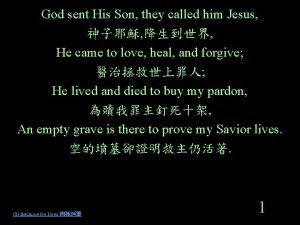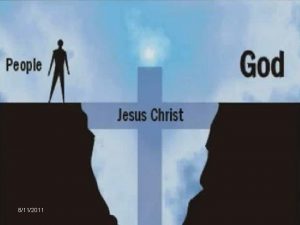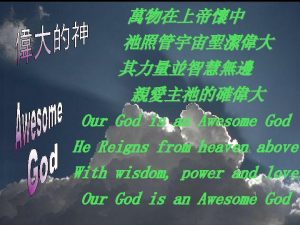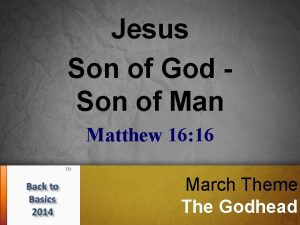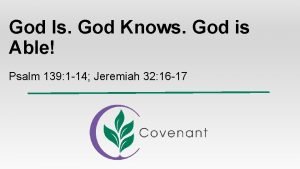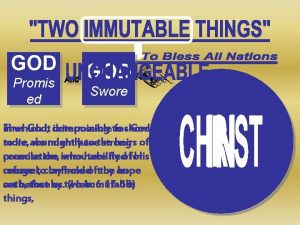Jesus the Son of God Jesus the Son












- Slides: 12

Jesus, the Son of God Jesus, the Son of Man Col 2: 9 For in him the whole fullness of deity dwells bodily…

The Son of God • The term “Son of Man” is used in Scripture in the contexts of Christ's deity (being the Son of God): o The Bible says that only God can forgive sins (Isaiah 43: 25; Mark 2: 7). Yet as the “Son of Man, ” Jesus had the power to forgive sins (Mark 2: 10). o Likewise, Christ will return to Earth as the “Son of Man” in clouds of glory to reign on Earth (Matthew 26: 63 -64). In this passage, Jesus is citing Daniel 7: 13 (I saw in the night visions, and behold, with the clouds of heaven there came one like a son of man, and he came to the Ancient of Days and was presented before Him. ) where the “son of man” with clouds of heaven came to the "Ancient of Days“ (.

Who is the “Ancient of Days”? • Dan 7: 9 “…his clothing was white as snow, and the hair of his head like pure wool; his throne was fiery flames; its wheels were burning fire. ” Rev 1: 14 The hairs of his head were white, like white wool, like snow. His eyes were like a flame of fire, • Dan 7: 10 “A stream of fire issued and came out from before him; a thousands served him, and ten thousand times ten thousand stood before him; the court sat in judgment, and the books were opened. ” Rev 5: 11 And I beheld, and I heard the voice of many angels round about the throne and the beasts and the elders: and the number of them was ten thousand times ten thousand, and thousands of thousands;

The Son of Man • The phrase “Son of Man” is a reference to Jesus' humanity but it is not a denial of His deity. By becoming a man, Jesus did not cease being God, or lost some of His diety, but rather the fulness of the Godhead was in Him bodily. (Col 2: 10) • The incarnation of Christ did not involve the subtraction of deity, but the addition of humanity. Jesus clearly claimed to be God on many occasions (Matthew 16: 16, 17; John 8: 58; 10: 30). But in addition to being divine, He was also human (see Philippians 2: 6 -8). He had two natures (divine and human) conjoined in one person.

The Son of God Is the Son of Man • When Jesus was asked by the high priest whether He was the “Son of God” (Matthew 26: 63), He responded affirmatively, declaring that He was the “Son of Man” who would come in power and great glory (verse 64). This indicated that Jesus Himself used the phrase “Son of Man” to indicate His deity as the Son of God. • Mat 26: 63 But Jesus remained silent. And the high priest said to him, “I adjure you by the living God, tell us if you are the Christ, the Son of God. ” • Mat 26: 64 Jesus said to him, “You have said so. But I tell you, from now on you will see the Son of Man seated at the right hand of Power and coming on the clouds of heaven. ”

The Son of Man is Our Kinsman-Redeemer • The phrase “Son of Man” identifies who Jesus is in relation to His incarnation and His work of salvation. In the Old Testament (Leviticus 25: 25 -26, 48 -49; Ruth 2: 20), the next of kin (one related by blood) always functioned as the “kinsman-redeemer” of a family member who needed redemption. Jesus became related to us “by blood” (that is, He became a man) so He could function as our Kinsman-Redeemer and rescue us from sin. • Lev 25: 25 “If your brother becomes poor and sells part of his property, then his nearest redeemer shall come and redeem what his brother has sold. ” • Rth 2: 20 And Naomi said to her daughter-in-law, “May he be blessed by the LORD, whose kindness has not forsaken the living or the dead!” Naomi also said to her, “The man is a close relative of ours, one of our redeemers. ”

The Son of God Is the Son of Man • Mat 24: 29 “Immediately after the tribulation of those days…Mat 24: 30 Then will appear in heaven the sign of the Son of Man, and then all the tribes of the earth will mourn, and they will see the Son of Man coming on the clouds of heaven with power and great glory. • The Son of Man will come on the “clouds of heaven. ” Clouds are often used in association with God’s visible glory (Exo 16: 10 l 40: 34 -35; 1 Ki 8: 10 -11; Matt 17: 5; 24: 30; 26: 64). Just as Jesus Christ was received by a cloud at His ascension (Acts 1: 9), so will He return in the clouds of heaven (Matt 24: 30; Mk 13: 26; Lk 21: 27). Just as He left with a visible glory of the Lord (clouds present), so will He return at the second coming with a visible show of the Lord’s glory.

The Son of Man • Jesus Christ’s humanity, like His diety, is an essential Christian doctrine. In His incarnation, He is both fully divine and fully human. To deny either constitutes a heresy (cf. 1 Jn 4: 3; 2 Jn 7). • Christ’s development as a human was normal in every aspect, with two major exceptions: o Jesus always did the will of the Father (Heb 4: 15) o He was tempted in all points as we are, yet without sin • But he experienced human birth (Matt 1: 23; Gal 4: 4); normal human growth (Matt 2: 11; Lk 2: 16, 40, 52; normal human growth (Matt 2: 11); normal human emotions(Jn 11: 35; Heb 5: 7), huner and thirst (Lk 4: 2; Jn 4: 1 -7; 19: 28); fatigue (Mk 6: 31; Jn 4: 6); pain (Matt 26: 46; Mk 15: 25 -34; Jn 19: 28) and death (Lk 24: 40; Jn 20: 27).

Hypostatic Union of Two Essences • Before the incarnation, Jesus was one person with one essence (divine). After incarnation, Jesus is still one person but with two essences (one divine and the other human). He referred to himself as a singular person (I, me, mine) • Divine essence refers to all that belongs to diety including attributes of diety. Human essences refers to all that belongs to humanity including all attributes of humanity. The attributes to one essence is never attributed to the other but they were attributed to one person of Jesus Christ. • Contradictory characteristics were attritubeted to Him: finite yet infinite; weak yet omnipotent, increasing in knowledge yet omniscient. But forever human and divine. His incarnation is not temporary but forever. (Acts 1: 11; Matt 26: 64) • The "kenosis" or "self-emptying" of Christ Jesus, according to Philippians 2: 5 -8, is just His self-restraint or self-limitation or self-inhibition of His Godhood as He took upon Himself not only the essence, form and functions of Man but also the form and works of a voluntarily humble, obedient and suffering SERVANT (Phil. 2: 1 -8; Jn. 17: 18; 20: 21) or APOSTLE (Heb. 3: 1).

No One Knows That Day and Hour • Mat 24: 36 But of that day and hour knoweth no man, not the angels of heaven, but my Father only. • Mar 13: 32 But of that day and that hour knoweth no man, not the angels which are in heaven, neither the Son, but the Father. • 1 Co 1: 24 But unto them which are called, both Jews and Greeks, Christ the power of God, and the wisdom of God. • Col 2: 3 In whom are hid all the treasures of wisdom and knowledge. • Eph 3: 11 According to the eternal purpose which he purposed in Christ Jesus our Lord:

No One Knows That Day and Hour • Note that the term “knowledge” in Col 2: 3 is in Greek is "gnoseous" which means information and/or intellectual awareness and/or cognition as contrasted with the Greek term "oudeis" in Mk. 13: 32 which the latter term means to be in charge of and/or to have the prerogative to designate/appoint/instigate. • Yet although the Father is in charge ("oida") of appointing exactly when the Second Coming of the Son shall take place on earth but the Son Himself knows ("gnosis") exactly when He will execute it. (Eph 3: 11, Heb 13: 20; Jn. 5: 18 -19; Jn. 14: 1 -3; Matt. 25: 1 -6) • Indeed Jesus knows ("ginoskein") all (Jn. 2: 24); thus it is IN the Person of the Lord Jesus Christ HIMSELF possesses all the treasures of wisdom and knowledge.

No One Knows That Day and Hour • It is Christ Jesus, the Almighty Lord God the Son incarnate and Perfect Man, who: o having the knowledge ("gnosis" = the information about and/or acquaintanship with) of all things (Jn 2: 24) and o being not only the POWER/ABILITY and WISDOM of God (1 Cor. 1: 24) but also o being the Son who performs all of His Father's purpose and doings (Eph. 3: 11; Jn. 4: 34; 5: 30; 6: 38), will, in His resurrected, immortalized, desexualized and glorified Perfect Manhood, will knowingly and willingly execute, accomplish and fulfil His Second Coming as determined and covenanted by the Father and the Son and witnessed to by the Holy Spirit.
 Jesus is the sweetest name i know
Jesus is the sweetest name i know Jesus in the morning jesus in the noon time
Jesus in the morning jesus in the noon time God sent his son they called him jesus
God sent his son they called him jesus Darling of heaven crucified
Darling of heaven crucified Crown him with many crowns hillsong
Crown him with many crowns hillsong Our god is an awesome god vine
Our god is an awesome god vine Our god is an awesome god
Our god is an awesome god Our god is an awesome god medley
Our god is an awesome god medley God is good god is great speed
God is good god is great speed O god you are my god earnestly i seek you
O god you are my god earnestly i seek you God-given virtues that direct us to our loving, triune god.
God-given virtues that direct us to our loving, triune god. Justice and virtue
Justice and virtue My god's bigger than your god
My god's bigger than your god


